
Hillbilly is a term for people who dwell in rural, mountainous areas in the United States, primarily in the Appalachian region and Ozarks. As people migrated out of the region during the Great Depression, the term spread northward and westward with them.

Helene Bertha Amalie "Leni" Riefenstahl was a German film director, photographer and actress known for producing Nazi propaganda.

Triumph of the Will is a 1935 German Nazi propaganda film directed, produced, edited and co-written by Leni Riefenstahl. Adolf Hitler commissioned the film and served as an unofficial executive producer; his name appears in the opening titles. It chronicles the 1934 Nazi Party Congress in Nuremberg, which was attended by more than 700,000 Nazi supporters. The film contains excerpts of speeches given by Nazi leaders at the Congress, including Hitler, Rudolf Hess and Julius Streicher, interspersed with footage of massed Sturmabteilung (SA) and Schutzstaffel (SS) troops and public reaction. Its overriding theme is the return of Germany as a great power with Hitler as its leader. The film was produced after the Night of the Long Knives, and many formerly prominent SA members are absent.

Barney Google and Snuffy Smith, originally Take Barney Google, for Instance, is an American comic strip created by cartoonist Billy DeBeck. Since its debut on June 17, 1919, the strip has gained a large international readership, appearing in 900 newspapers in 21 countries. The initial appeal of the strip led to its adaptation to film, animation, popular song, and television. It added several terms and phrases to the English language and inspired the 1923 hit tune "Barney Google " with lyrics by Billy Rose, as well as the 1923 record "Come On, Spark Plug!"

William Morgan DeBeck, better known as Billy DeBeck, was an American cartoonist. He is most famous as the creator of the comic strip Barney Google, later retitled Barney Google and Snuffy Smith. The strip was especially popular in the 1920s and 1930s, and featured a number of well-known characters, including the title character, Bunky, Snuffy Smith, and Spark Plug the race horse. Spark Plug was a merchandising phenomenon, and has been called the Snoopy of the 1920s.

Edgar Livingston Kennedy was an American comedic character actor who appeared in at least 500 films during the silent and sound eras. Professionally, he was known as "Slow Burn", owing to his ability to portray characters whose anger slowly rose in frustrating situations.
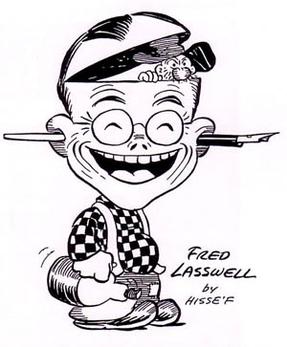
Fred D. Lasswell was an American cartoonist best known for his decades of work on the comic strip Barney Google and Snuffy Smith.
Jungle Records is a British independent record label formed in 1982, specialising in punk rock, post punk, gothic and alternative releases.
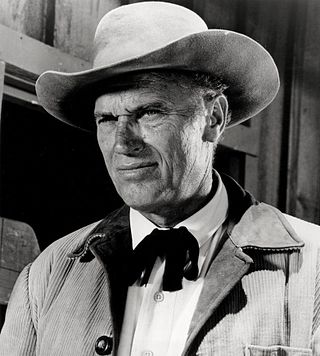
Robert Joseph Wilke was an American film and television actor noted primarily for his roles as villains, mostly in Westerns.
Feldzug in Polen is a 69-minute Nazi propaganda film released in 1940 depicting the 1939 invasion of Poland and directed by Fritz Hippler. Portraying the Poles as aggressors and ethnic Germans living in Poland as an oppressed minority, the film alleges that the Poles employed unheroic tactics in the war and characterizes as senseless the defence of a besieged Warsaw. The film was often screened by German minorities overseas to clarify the German point of view.
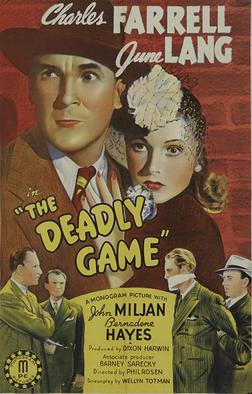
The Deadly Game is a 1941 American thriller film directed by Phil Rosen and starring Charles Farrell, June Lang and John Miljan. The film was produced and distributed by Monogram Pictures. It was Farrell's 53rd and final film appearance, although he would reemerge more than a decade later on television as the lead in My Little Margie.

Bud Duncan was an American actor of the silent era, most known for his early work with silent film comedian Lloyd Hamilton. He appeared in more than 160 films between 1912 and 1942.
DeWitt "Snuffy" Jenkins was an American old time banjo player and an early proponent of the three-finger banjo style.
Popeye Meets the Man Who Hated Laughter, also known as The Man Who Hated Laughter, is a 1972 American animated one-hour television special that was part of The ABC Saturday Superstar Movie. This film united characters from almost every newspaper comic strip then owned by King Features Syndicate in one story. The show aired on October 7, 1972, and was repeated in February 1974.
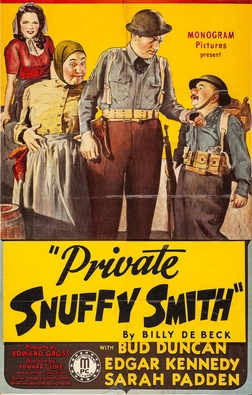
Private Snuffy Smith is a 1942 American army comedy film directed by Edward F. Cline and starring Bud Duncan as comic-strip character Snuffy Smith and Edgar Kennedy as his commanding officer. A sequel, Hillbilly Blitzkrieg, was released later in 1942 and also featured Duncan and Kennedy. The comic strip's characters Barney Google and Sparkplug the horse do not appear in the film.
Alexander Brian Rossino is an American historian and writer specializing in World War II in Poland and the American Civil War.

Where's Waldo? is an American animated children's television series produced by DreamWorks Animation Television, based on the Where's Wally? book series created by Martin Handford. It is the second television adaptation of the series, succeeding the 1991 animated series, and incorporates elements from that series. The series debuted on Universal Kids on July 20, 2019. It moved to the streaming service Peacock for its second season on July 15, 2020. Additional episodes of the series aired on December 11 the same year. Other media featuring the titular character include the 1991 original animated television series and the series of books.
Homer "Pappy" Lee Sherrill was an American Old Time and Bluegrass fiddler.
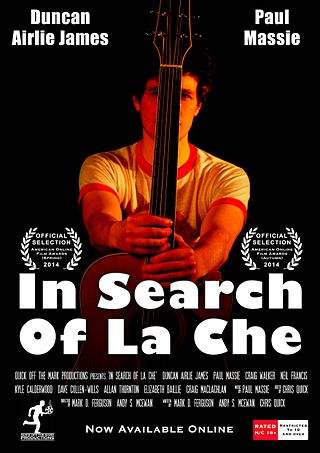
In Search of La Che is a Scottish spoof documentary film directed by Mark D. Ferguson. The screenplay was written by Andy S. McEwan.

Swing, Cowboy, Swing is a 1946 American musical Western film directed by Elmer Clifton and starring Cal Shrum, Max Terhune and Alta Lee. It was shot at the Corriganville Movie Ranch in California. In 1949 it was reissued under the alternative title of Bad Man from Big Bend.














